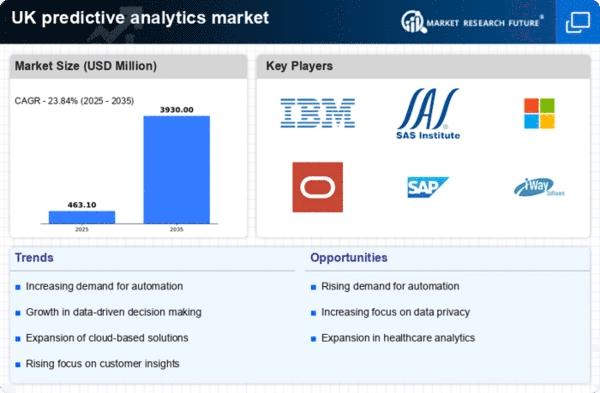Expansion of Cloud-Based Solutions
The shift towards cloud-based solutions is significantly influencing the predictive analytics market. In the UK, organizations are increasingly adopting cloud technologies to facilitate the deployment of predictive analytics tools. This transition allows for greater scalability, flexibility, and cost-effectiveness. As of November 2025, it is estimated that over 60% of businesses in the UK utilise cloud-based platforms for their analytics needs. The ability to access real-time data and analytics from anywhere enhances decision-making processes and fosters collaboration among teams. Furthermore, cloud solutions often come with advanced security features, addressing concerns related to data privacy. This trend indicates a strong future for the predictive analytics market as more organisations embrace cloud technologies to harness the power of data.
Increased Focus on Customer Experience
Enhancing customer experience is a primary driver for the predictive analytics market. UK businesses are increasingly utilising predictive analytics to gain insights into customer behaviour and preferences. By analysing historical data, organizations can tailor their offerings to meet the specific needs of their customers, thereby improving satisfaction and loyalty. Recent studies suggest that companies employing predictive analytics to enhance customer experience can see an increase in customer retention rates by up to 15%. This focus on customer-centric strategies is likely to propel the growth of the predictive analytics market as organisations strive to create personalised experiences that resonate with their target audiences.
Regulatory Compliance and Risk Management
The predictive analytics market is also being driven by the need for regulatory compliance and effective risk management. In the UK, businesses are facing increasing scrutiny regarding data handling and privacy regulations. Predictive analytics tools enable organizations to assess risks and ensure compliance with various regulations, such as GDPR. By leveraging predictive models, companies can identify potential compliance issues before they escalate, thereby mitigating risks. This proactive approach not only safeguards organisations from potential fines but also enhances their reputation in the market. As regulatory landscapes continue to evolve, the demand for predictive analytics solutions that support compliance efforts is expected to grow.
Advancements in Technology and Infrastructure
Technological advancements are playing a crucial role in shaping the predictive analytics market. In the UK, improvements in data processing capabilities and infrastructure are enabling organizations to analyse vast amounts of data more efficiently. The rise of big data technologies, coupled with enhanced computational power, allows for more sophisticated predictive models. As of November 2025, it is estimated that investments in analytics infrastructure have increased by over 30% in the past two years. This trend suggests that organisations are recognising the importance of robust analytics capabilities in driving business success. Consequently, the predictive analytics market is likely to benefit from these advancements, as companies seek to leverage technology to gain a competitive edge.
Rising Demand for Data-Driven Decision Making
The predictive analytics market is experiencing a notable surge in demand as organizations increasingly recognise the value of data-driven decision making. In the UK, businesses are leveraging predictive analytics to enhance operational efficiency and improve customer experiences. According to recent estimates, the market is projected to grow at a CAGR of approximately 25% over the next five years. This growth is largely attributed to the need for organisations to remain competitive in a rapidly evolving landscape. By utilising predictive analytics, companies can anticipate market trends, optimise resource allocation, and ultimately drive profitability. The integration of advanced analytics into business strategies is becoming a standard practice, thereby solidifying the role of predictive analytics in shaping future business outcomes.
















